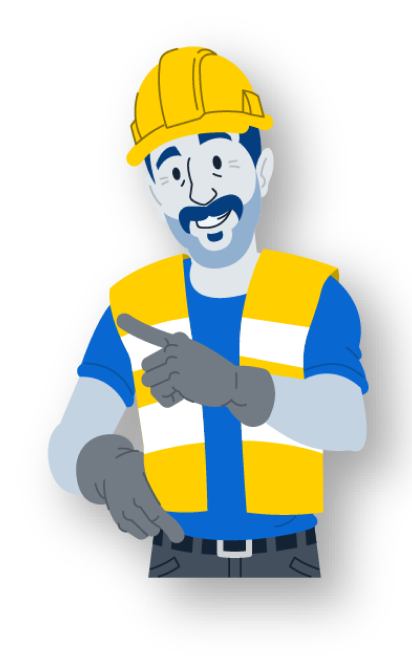As you’ve landed here, we suspect you’re already familiar with CRM — Customer Relationship Management — and the value it could bring to your organization. But how do you make sure you’re making the right decisions while choosing and implementing your CRM software? We’re here to help you with that.
You probably have a significant amount of data to organize and manage — which is exhausting because of the fast-paced nature of data development. Some businesses use spreadsheets and whiteboards to manage this, which we don’t recommend.
You need a solid, fully-fledged customer relationship management solution to effectively manage the data needed to build better relationships with your customers. But it’s easy to make mistakes with CRMs. Here are five common ones you should avoid as a contractor.
1. Using CRM Inconsistently
The first — and probably the most obvious — mistake is not relying on a CRM long-term. Building trustful customer relations is a time-consuming process; you can’t rush it. Simply put, there are no shortcuts.
Choose a solid customer relationship management platform and stick to it to make the most out of it. Analyzing customer data and deriving information from it to sustain customer relations takes a while; you have to be consistent with it.
Pick your customer relationship management software carefully. Find one that works the best for your specific needs. And choose a CRM that works the best for your field. Then, use it daily and make it part of your routine to reap the maximum benefits.
2. Using a CRM That Isn’t Integrated with Other Software
A key element of customer relationship management is integrations with other software. A CRM solution should integrate with other pieces of software used in the industry. A mediocre solution will leave you alone in the dark with no external integrations.
For a CRM to derive the most accurate data, it should work in collaboration with other software used in the field. If the workforce has to manually insert the information into multiple tools, the chances of human error rise exponentially.
An integrated CRM doesn’t require any human input. Manually inserting data into multiple tools wastes a lot of time, which could be better spent performing other important tasks.
You’re in luck though! Because Followup CRM, a popular customer relationship management tool for those in the construction industry, integrates with dozens of tools, including CompanyCam!
3. Using a Non-industry Specific CRM
CRMs can be altered to all business models in various industries. Generic customer relationship management solutions, like Salesforce and Pipedrive, don’t use many of the terminologies used in the construction industry, for example.
Generic CRMs work for many on the market, but they’re not tailored to specific fields, nor do they follow the same bidding process.
You wouldn’t go to a primary doctor for brain surgery, would you? The same should apply to the CRM you invest in.
A tailored customer relationship management solution, like Followup CRM for the construction industry, uses the right terminologies and sales process. It’s built with the idea of winning construction work from major clients through bidding.
4. Using a CRM That Doesn’t Provide Analytics and Reports
Your CRM should provide important analytics and reports. Those reports are valuable to the crew members working out there, bidding projects.
Your customer relationship management tools should be serving the employees winning the jobs for you. If the customer relationship management solution doesn’t provide reports and analytics, it won’t bring you respectable positive results.
A good CRM will help your sales team choose and bid on projects that actually matter. Such projects have the potential to be extremely beneficial. The simplified, data-backed bidding process saves you time. Time is no longer wasted bidding on non-beneficial projects.
Followup CRM provides you with all the necessary information, reports, and statistics your workforce needs to make better bids on profitable projects.
5. Not Leveraging CRM During Sales Meetings
A good CRM will provide insights into getting the most out of every sales meeting.
Use your CRM during each meeting to attract the best clients—your CRM will provide the analytical data to help guide your strategy and efforts.
Sales meetings keep your team on the same page. They make sure everything is going smoothly. Important topics to discuss during sales meetings are:
- your wins from last week
- leads
- bids
- pipeline
- contracts
- to-dos
- needs and requirements (and more!)
Leveraging the right CRM means having a visual overview of your company and how team members have progressed through the week. And you’ll see what sales activities have been scheduled, letting you figure out who’s performing at the required pace and who’s lagging behind.
The Bottom Line
Every modern organization needs to leverage the power of customer relationship management to drive competitive sales. However, not all CRM solutions work for every industry. Some industries require industry-specific solutions, and construction is one of them.
Followup CRM is a construction-specific, tailored customer relationship management solution for contractors. It has all the required features built for contractors to bid on and win the best projects. It has many integrations with other construction-related software, which you won’t find in generic CRM solutions.
Want to learn more about Followup CRM? Click here to request a live demo and see it in action for yourself!





